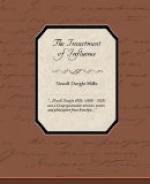History portrays many men of giant minds whose intellect could not redeem them from aimlessness and obscurity. Not until some divine enthusiasm descended upon the mind and baptized it with heroic action did these men find themselves. To that young patrician, Saul, journeying to Damascus, came the heavenly vision, and the new impulse of the heart made his cold mind warm, lent wings to his slow feet, made all his days powerful, made his soul the center of an immense activity. This glowing heart of Paul explains for us the fact that he achieved freedom of thought and speech, endured the stones with which he was bruised, the stocks in which he was bound, the mobbings with which he was mutilated; explains also his eloquence, known and unrecorded; explains his faith and fortitude, his heroism in death. And not only has the zeal of the heart made strong men stronger, turned weak men into giants, lent the soldier his conquering courage and lent the scholar a stainless life—to men whose will has been made weak by indulgence, the new love has come to redeem intellect and will from the bondage of habit.
No one who ever heard John B. Gough can forget his marvelous eloquence, his wit and his pathos, his scintillating humor, his inimitable dramatisms. He did not have the polished brilliancy of Everett or the elegant scholarship of Phillips, and yet when these numbered thousands of admirers, Gough numbered his tens of thousands. In his autobiography this man tells us to what sad straits passion had brought him; how he reflected upon the injury he was doing himself and others, only to find that his reflections and resolutions snapped like cobwebs before the onslaught of temptation. One night the young bookbinder drifted into a little meeting and, buttoning his seedy overcoat to conceal his rags, in some way he found himself upon his feet and began to speak. The address that proved a pleasure to others was a revelation to himself. For the first time Gough tasted the joys of moving men and mastering them for good. Within a week that love of public speech and useful service had kindled his mental faculties into a creative glow. The new and higher love of the heart consumed the lower love of the body, just as the sun melts manacles of ice from a man’s wrist.




